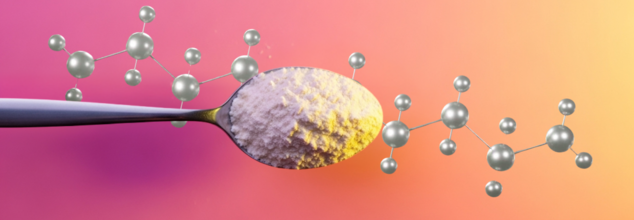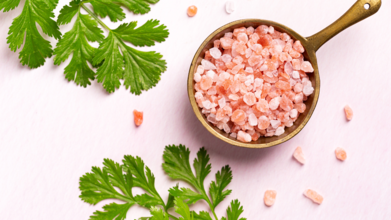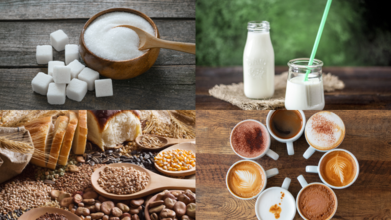- Health Conditions A-Z
- Health & Wellness
- Nutrition
- Fitness
- Health News
- Ayurveda
- Videos
- Medicine A-Z
- Parenting
- Web Stories
It’s In Cheese, Soy And Semen! This Natural Compound Can Help People Live Longer

Credits: Health and me (representational)
We have been conditioned to believe longevity is a matter of eating better, sleeping more, and getting our steps in. While that still holds true, researchers and biohackers are increasingly turning their attention to lesser-known compounds that might actually influence how long and how well we live.
The answer is spermidine. Yes, the name sounds awkward, and yes, it was first isolated from semen but if you can get past the origin story, the science behind it is turning heads in longevity research circles. From Japanese medical traditions dating back over a millennium to cutting-edge anti-aging routines in Silicon Valley, spermidine is being taken seriously and for good reason.
What Is Spermidine?
Spermidine is a naturally occurring polyamine, a compound found in nearly every cell in your body. It plays a critical role in cell growth, repair, and renewal. Over time, as we age, the body’s natural production of spermidine declines, leading scientists to explore ways to replenish it through food, supplements, or gut microbiota enhancement.
And yes, while semen was the first biological source it was isolated from (hence the name), spermidine is found in many places: mushrooms, broccoli, aged cheese, breast milk, and even fermented soybeans.
Connection Between Longevity and Sexual Energy
Centuries before spermidine had a name, Eastern traditions were tapping into its potential. In the 28th scroll of Ishinhō — one of Japan’s oldest medical texts — there are specific longevity practices linked to preserving jingqi (life force), emphasizing sexual energy and non-ejaculatory arousal for men. While the text didn’t mention spermidine, the biological rationale seems to track. Now, scientists believe that higher levels of this compound in semen and breast milk may play a part in growth, repair, and immune regulation.
What Can Spermidine Actually Do?
While human trials are still in early stages, preclinical and observational research has shown potential in a number of areas:
Anti-Aging at the Cellular Level
One of the most exciting findings is spermidine’s role in autophagy, a process where cells clean out damaged components to regenerate newer, healthier ones. This mechanism is vital for slowing aging and preventing chronic diseases. Animal studies have shown that spermidine supplementation extended lifespan in mice, yeast, and even worms.
For humans, the jury is still out, but that hasn’t stopped biohackers and longevity enthusiasts — like tech entrepreneur Bryan Johnson — from incorporating spermidine into their daily anti-aging regimens alongside plasma therapy and micronutrient stacks.
Heart Health and Longevity
A 2018 study found that spermidine could improve heart function in mice and extend their lifespan. Even more compelling: a population study involving more than 2,500 participants found that higher spermidine intake was associated with reduced cardiovascular mortality.
These heart benefits are believed to stem from spermidine’s ability to reduce inflammation and improve mitochondrial function — both critical for aging hearts.
Fertility and Reproduction
Although the connection between spermidine and reproduction isn’t surprising given its original source, it’s now being studied more seriously. One trial found that middle-aged mice given high doses of spermidine had improved fertility outcomes — faster egg maturation and larger litters.
There’s growing speculation that spermidine might enhance reproductive longevity in humans, particularly for women looking to extend fertility windows.
Brain Function and Cognitive Health
Cognitive decline is one of aging’s most distressing effects. A 2020 study found that spermidine consumption protected rodents from age-related brain deterioration, including memory lapses and motor impairment.
Scientists are hopeful that these findings can eventually translate into dietary interventions or supplements that may help stave off neurodegenerative conditions like Alzheimer’s or Parkinson’s in humans.
Immunity and Inflammation
Chronic inflammation is a common denominator across many diseases. Because spermidine encourages autophagy and cellular cleanup, researchers believe it could support immune function and help the body respond better to infections or injury — particularly as we age.
Why the Gut Microbiome is Important For Long Life?
Interestingly, your body doesn’t just get spermidine from food. It’s also produced by the gut microbiota, the community of bacteria and microorganisms living in your digestive tract but as we age, the microbiome shifts, and production of key polyamines like spermidine declines.
That’s why some supplements (like Primeadine) combine spermidine with prebiotics to stimulate the body's natural production and absorption. It's a multi-pronged approach — one that respects the interplay between food, microbes, and molecular health.
Where You Can Get Spermidine Naturally?
You don’t have to pop a pill to boost your spermidine levels. It’s found in:
- Soybeans and fermented soy products (especially natto, a traditional Japanese dish)
- Aged cheese
- Mushrooms (like shiitake)
- Spinach and broccoli
- Cauliflower and fresh green pepper
- Amaranth grain
- Pumpkin and grapefruit
Of all these, natto contains the highest spermidine levels — though it’s not the most accessible or palatable option for everyone. For those who prefer to avoid its gooey texture and intense smell, spermidine supplements derived from wheat germ or fermented soy may be a better bet.
Is It Safe?
Here’s the reassuring part: Clinical trials so far show that spermidine supplements are generally safe, with no known side effects. Because it’s a compound your body already produces, it’s well-tolerated. However, long-term effects in humans haven’t been fully studied yet, so moderation and medical consultation are still wise.
The idea that a compound first discovered in semen could help people live longer might sound like something out of a biohacking satire — but the science behind spermidine is growing rapidly. From cellular recycling to heart health and fertility, it shows real promise as a multifunctional longevity aid.
Still, this isn’t a miracle fix. No supplement can replace the fundamentals: movement, real food, sleep, connection. But as we learn more about how our cells age and how we might intervene, spermidine could well become part of the broader toolbox for healthier, longer living.
Whether you're experimenting with fermented soy or considering supplements, the goal remains the same — to live longer, better, and with more vitality. And if a little-known polyamine can help get us there, awkward name or not, it’s worth paying attention to.
Alia Bhatt Swears By Dal-Chawal, Not Salads: The Desi Vegan Diet That Could Transform Your Health

(Credit- Alia Bhatt/Instagram)
From her debut in ‘Student of the Year’, to her latest movie adventures like ‘Jigra’, Alia Bhatt is one of the most versatile actors in Bollywood and is well-liked celebrities in India. In an ‘Aap Ki Adalat’ interview a few years ago Bhatt revealed that one of the major components of her diet is no sugar.
She expressed how she needed a variety of dishes, calling herself full ‘desi’. Another surprising thing she revealed was that she didn’t understand or like salads and prefers ‘Daal Chawal’ which is rice and lentil soup filled with whole grains and vegetables. She also mentioned that her choice of breads was roti made with ragi grains, jawar and other millets.
Is Rice And Lentil Soup A Weight Loss?
Although people expect Bollywood starlets to enjoy rich and nutritious salads, Alia Bhatt’s refreshingly desi home diet bring about the discussion of whether one needs diet food or just needs to understand their nutritional needs better. Dal and rice are a perfect combination of carbohydrates, protein, and essential nutrients. To get the most nutritional benefit from this classic pairing, it's a good idea to make a few simple tweaks.
- Don't just rely on white rice. Try incorporating whole-grain varieties like brown, red, or black rice into your meals to add more fiber and antioxidants.
- Add vegetables, herbs, and spices to your dal to make it more nutrient-rich.
- Mix peas or beans into your rice. They are full of fiber and antioxidants, which can help improve blood sugar, cholesterol, and blood pressure.
- Pair your meal with a side. Serving your dal-chawal with yogurt adds healthy bacteria for your gut, while a fresh salad provides more vitamins and fiber.
- Balance your plate. A simple way to eat mindfully is to follow a "MyPlate" approach. Fill half your plate with fruits and vegetables, and divide the other half between a protein (like meat or fish) and a grain (like white rice).
Why You Should Eat Ragi, Jawar And Other Millet Rotis
Instead of regular wheat rotis, try healthy grains like ragi and jowar. These millets are packed with nutrients that can do wonders for your health.
Ragi is an excellent source of calcium and iron, which are essential for strong bones and healthy blood. Its high fiber content also helps with digestion, weight management, and stable blood sugar.
Jowar is loaded with protein, fiber, and antioxidants. It's great for digestion, can help with weight loss, and also lowers cholesterol for a healthier heart.
A 2024 study in Frontiers in Nutrition journal explained that adding more millets to your diet is a smart decision as they contain a great mix of carbohydrates, protein, fat, and fiber. They have more essential amino acids than common cereals, and their protein is easier for the body to digest.
While millets have always been a staple food, recent studies are highlighting their impressive medicinal properties. Eating millets has been scientifically shown to help with:
- They have a type of starch that digests slowly, which prevents blood sugar spikes.
- Millets can help you feel full and satisfied, aiding in weight loss.
- Regular consumption can reduce the risk of heart disease.
- Millets are naturally gluten-free, making them an ideal food for people with celiac disease.
Is A Sugar-Free Diet Actually Healthy?
Cutting out added sugar and focusing on whole foods can have a great impact on your health. It can help you manage your weight, lead to clearer skin, and improve your mood. It also helps reduce inflammation and lowers your risk of developing type 2 diabetes.
However, it's important not to confuse added sugars with the natural sugars found in fruits. Fruits provide essential nutrients like fiber and antioxidants. You can still have a very healthy diet by including whole fruits.
Remember, a no-sugar diet isn't a magic fix for weight loss. It's just one part of a healthy lifestyle that should also include exercise and a balanced diet. If you're thinking about making a big change to your diet, it's a good idea to talk to a doctor or dietitian first.
Ditch The Pink Salt Trick Recipe, Try These 4 Drinks Instead To Support Your Weight Loss Journey

Credits: Canva
Social media platforms have introduced many of us to hacks and trends that promise quick fixes for health and wellness. Some of them are harmless fun, but others can spread misinformation and lead to unhealthy habits. One such viral trend is the Pink Salt Trick Recipe, a drink made from pink Himalayan salt, lemon juice, and water, which is being promoted as a shortcut to fat loss and a “metabolism reset.”
But can sprinkling some pink salt into water really help you drop weight? Let’s unpack the facts and explore healthier alternatives that actually support your wellness journey.
Can You Lose Weight with the Pink Salt Trick?
The short answer is no. Despite claims circulating on TikTok and YouTube, often boosted by AI-generated celebrity deepfakes, there is no scientific evidence that pink salt speeds up fat burning, “melts fat,” or resets metabolism.
In fact, experts warn against overconsumption of pink salt. Unlike iodized table salt, pink salt contains little to no iodine, which could potentially disrupt thyroid health if used as your primary salt source. Excess sodium can also increase blood pressure and cause bloating, which is the opposite of what most people are hoping for when they try to lose weight.
Missouri State University’s investigation with registered dietitian Natalie Allen confirmed: “Pink salt does not speed up metabolism, detox the body, or cause weight loss.”
Healthy Drink Alternatives That Actually Support Weight Loss
While no single drink can magically make fat disappear, some beverages can boost metabolism slightly, reduce cravings, and support better digestion, all of which help your weight-loss efforts when paired with a healthy lifestyle. Here are four expert-approved options:
Green Tea
Packed with catechins, powerful antioxidants, green tea can slightly boost calorie expenditure and fat oxidation. It’s a popular pre-workout drink because it provides a mild caffeine kick without the jitters of coffee.
Apple Cider Vinegar Drink
A teaspoon of apple cider vinegar in a glass of water before meals may promote a feeling of fullness and stabilize blood sugar levels. Just make sure to dilute it well to avoid damaging your teeth or irritating your stomach.
Protein Smoothies
Blending a scoop of protein powder with unsweetened almond milk, spinach, and berries can keep you full for hours, reduce snacking, and support muscle maintenance, which is key for a healthy metabolism.
Ginger and Lemon Water
Ginger aids digestion and reduces inflammation, while lemon adds vitamin C and a refreshing flavor. Together, they make a hydrating drink that can be sipped throughout the day to curb unnecessary cravings.
Risks and Caution
Even with these healthier drinks, overconsumption can cause issues like bloating, digestive discomfort, or nutrient imbalances if you replace whole meals with beverages. Some ingredients, like caffeine or apple cider vinegar, may also interact with medications or cause irritation if taken excessively.
No Magic Shortcut
Drinks can support your weight-loss journey, but they cannot replace the fundamentals: a balanced diet, regular exercise, adequate sleep, and stress management. Use beverages like green tea or ginger water as helpful tools, not as miracle solutions.
Disclaimer: Weight loss is a gradual process and cannot be achieved by drinking one special beverage. The drinks mentioned here can help with metabolism, digestion, and reducing cravings, but long-term results require consistency with physical activity, balanced nutrition, and overall lifestyle changes.
Sadhguru Says These 4 Foods Are Like Slow Poison For Your Body

Credits: Canva
Good health isn’t just about eating the right foods, it’s also about knowing what to avoid. Spiritual leader, Sadhguru, often emphasizes that certain foods we consume every day can silently harm our bodies over time. He calls them “enemies of health” and advises limiting or completely avoiding them.
Refined Sugar
According to Sadhguru, sugar as we consume it today is not the same as what our ancestors ate. Traditionally, sweeteners came from natural sources like jaggery or unrefined sugarcane juice. Modern white sugar, however, is highly processed and stripped of vitamins and minerals, leaving behind only “empty calories.”
Also Read: International Fetal Alcohol Syndrome Day 2025: Themes, Significance And History
Excessive sugar intake has been linked to obesity, diabetes, and heart disease. Sadhguru points out that it not only adds to weight gain but also weakens the immune system and disrupts the body’s natural balance. Choosing natural sweeteners like jaggery, honey, or fruits can be a healthier alternative.
However, Dr Palaniappan, who runs his YouTube channel under the name Dr Pal, a gastroenterologist says that jaggery or sugar do not really have that much of a difference. He explains that while 2 teaspoon of sugar have 8 grams of carbs, 2 teaspoon of jaggery have 6 grams of carbs. The difference is not that much, if your carbohydrate consumption is 200 grams per day. However, he does note that jaggery has a lower sugar spike.
Milk
While milk is often marketed as a superfood, Sadhguru suggests that most adults are unable to digest it properly. Many people lack the enzymes required to break down lactose, which can lead to bloating, mucus formation, and lethargy.
Although milk is a good source of calcium, Sadhguru recommends relying on other calcium-rich foods such as leafy greens, sesame seeds, ragi (finger millet), and nuts. Limited milk consumption is fine for those who tolerate it, but he advises against making it a daily habit for everyone.
The Physicians Committee for Responsible Medicine quotes Harvard Study that followed 72,000 women for two decades and found no evidence that drinking milk can prevent bone fractures or osteoporosis. The conclusion was milk does not necessarily build the strongest bones, though this is not to say that it has no nutrients. In fact, an estimated of 65% of the global population is lactose intolerant, majority of whom are from Asia.
Also Read: Kissing Bugs Disease Could Soon Become An Endemic, Says CDC
Refined Grains
Modern refining processes remove the outer bran and germ from grains, leaving only the starchy endosperm. This process makes the grains last longer on shelves but takes away most of the fiber, vitamins, and minerals. As a result, refined grains like white rice and maida (white flour) provide little nutrition and cause rapid spikes in blood sugar.
Sadhguru encourages the consumption of whole grains such as brown rice, millets, and whole wheat to promote better digestion, sustained energy, and improved gut health.
Tea and Coffee
Tea and coffee may be morning essentials for many, but Sadhguru cautions against their overuse. These beverages act as nervous stimulants, giving a quick burst of energy but leaving the body more tired later. Habitual consumption can lead to dependency, sleep disturbances, and heightened stress levels.
He recommends gradually reducing intake and replacing these drinks with herbal teas, fresh juices, or simply water to maintain natural energy levels throughout the day.
© 2024 Bennett, Coleman & Company Limited

